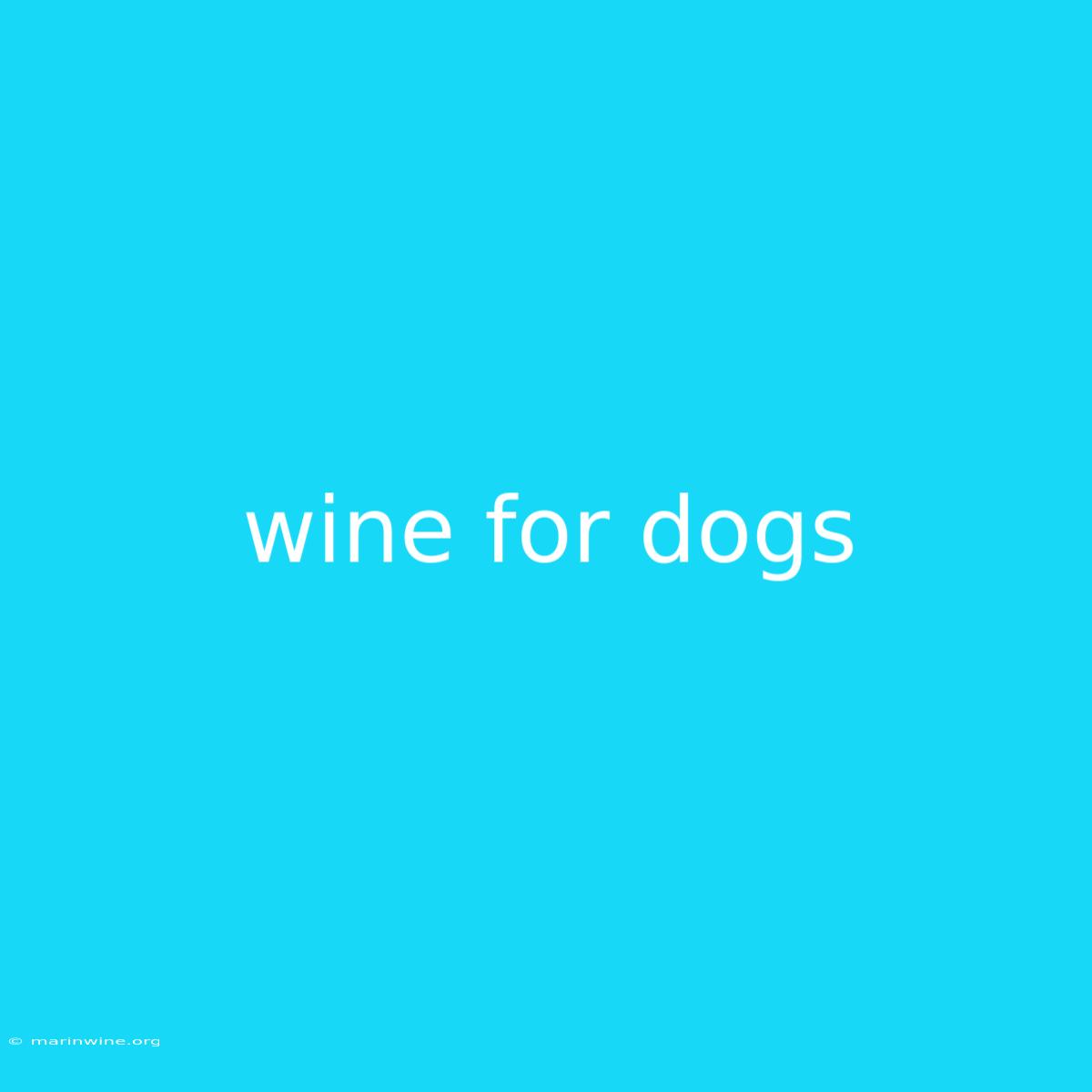Can Dogs Drink Wine? Uncorking the Truth About Fido and Fermented Grapes
Editor's Note: "Wine for dogs" – a phrase that might spark curiosity or even concern. Is there really such a thing? Let's delve into the truth about dogs and wine.
Why It Matters: Understanding the potential risks and benefits of dogs and wine is crucial for responsible pet ownership. This article examines the science behind the interaction, highlighting key takeaways and exploring the multifaceted aspects of this intriguing topic.
Key Takeaways:
| Point | Takeaway |
|---|---|
| Wine and Dogs | Dogs should never consume wine. |
| Alcohol Toxicity | Even small amounts can cause serious health problems. |
| Grape Toxicity | Grapes and raisins are toxic to dogs. |
| Alternatives | Plenty of safe and delicious treats exist for dogs. |
Wine and Dogs: A Complex Relationship
Introduction: While a glass of wine may be a relaxing treat for humans, it's essential to remember that dogs are completely different. Their bodies react differently to alcohol, and consuming even a small amount can have severe consequences.
Key Aspects:
- Alcohol Toxicity: Dogs are much smaller than humans, and their bodies process alcohol differently. A small amount of wine can lead to alcohol poisoning, causing symptoms like vomiting, diarrhea, tremors, disorientation, and even coma.
- Grape Toxicity: Both grapes and raisins contain toxins that can cause kidney failure in dogs. Wine, of course, is made from grapes, making it a double threat.
- Misconceptions: You might see "dog wine" or "dog beer" advertised, but these are often non-alcoholic drinks that are safe for dogs. However, never assume a product is safe without checking with your veterinarian.
Understanding the Risks:
Alcohol Poisoning: The effects of alcohol poisoning in dogs can range from mild to life-threatening. Even a few drops of wine can cause significant damage, particularly in small breeds.
Grape Toxicity: The exact toxic compound in grapes and raisins is unknown, but it can cause severe kidney damage within hours of ingestion. The symptoms can be subtle at first, but they can quickly escalate to kidney failure, requiring emergency veterinary care.
Safe Alternatives for Your Furry Friend:
Introduction: There are plenty of safe and delicious treats for dogs that don't pose any health risks.
Further Analysis: Consider offering your dog:
- Dog-specific treats: There are numerous commercially available treats designed specifically for dogs, with flavors and textures they enjoy.
- Homemade snacks: With your veterinarian's guidance, you can create healthy and safe snacks using dog-friendly ingredients like carrots, apples, and peanut butter (ensure it's xylitol-free).
- Chew toys: Chew toys can provide mental stimulation and dental hygiene benefits while keeping your dog entertained.
FAQ
Introduction: Here are some frequently asked questions about dogs and wine.
Questions:
- Q: My dog accidentally drank a little wine. What should I do? A: Contact your veterinarian immediately. They can advise you on the best course of action based on the amount consumed and your dog's size.
- Q: Is it okay to give my dog a small amount of wine? A: No, it is never safe to give your dog any amount of alcohol, even a tiny bit.
- Q: What about wine-flavored dog treats? A: Be cautious with these. Ensure they are genuinely non-alcoholic and safe for dogs. Always read labels carefully and consult your veterinarian.
- Q: My dog seems fine after drinking a little wine. Should I be worried? A: Don't assume that because your dog appears fine, there's no problem. Alcohol and grape toxicity can take time to manifest, and symptoms can be delayed. It's always best to seek professional veterinary advice.
- Q: What are some safe alternatives to wine for my dog? A: Water is always the best option. You can also give your dog safe, dog-specific treats or homemade snacks.
- Q: Can I give my dog wine vinegar? A: Wine vinegar is also unsafe for dogs, as it still contains grape products.
Summary: While the idea of sharing a glass of wine with your furry companion might seem appealing, it's crucial to remember that alcohol and grapes are toxic to dogs. There are plenty of safe and delicious alternatives to keep your dog happy and healthy.
Tips for Responsible Pet Ownership:
Introduction: Here are some tips for ensuring your dog's safety:
Tips:
- Keep all alcoholic beverages out of reach: Store wine and other alcoholic drinks securely, where your dog cannot access them.
- Be mindful of spills and drips: Clean up any spills promptly to prevent your dog from licking them up.
- Read labels carefully: Pay attention to ingredients in dog treats, especially those advertised as "wine-flavored."
- Consult your veterinarian: If you have any concerns about your dog's health, contact your veterinarian immediately.
- Educate yourself: Stay informed about common pet toxins and safe alternatives to ensure your dog's well-being.
Summary: By following these tips, you can create a safe and healthy environment for your canine companion.
Summary by Wine and Dogs:
This article explored the complex relationship between dogs and wine, highlighting the dangers of alcohol and grape toxicity. We emphasized that even small amounts of wine can be harmful to dogs, and there are many safe and enjoyable alternatives. By understanding the risks and implementing responsible practices, you can ensure the health and safety of your beloved furry friend.
Closing Message: Remember, your dog's health is paramount. Choose safe and appropriate treats and always consult your veterinarian if you have any questions or concerns. Let's enjoy the company of our canine companions responsibly, knowing we are providing them with the best possible care.

